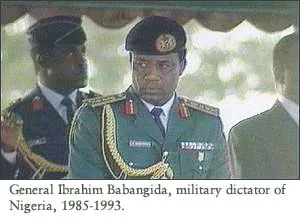New York, August 27, 2001—CPJ urges former Nigerian military dictator Gen. Ibrahim Babangida to testify before the Nigerian Human Rights Violations Investigations Commission about his alleged responsibility for the 1986 murder of prominent journalist Dele Giwa.
“It is time to solve the 15-year mystery of Dele Giwa’s murder,” said CPJ executive director Ann Cooper. “We call on General Babangida to confront the allegations implicating him in Giwa’s death.”
On October 19, 1986, a parcel bomb killed Giwa, the founding editor of the Lagos-based weekly magazine Newswatch. According to Giwa’s lawyer, Chief Gani Fawehinmi, State Security Services (SSS) officials summoned the popular editor to their headquarters on October 17, just 48 hours before he was killed.
At the SSS offices, according to Fawehinmi, Lt. Col. A.K. Togun accused Giwa of planning a social revolution and of smuggling arms into the country.
The next day, Giwa’s wife received two phone calls from a man who identified himself as Col. Halilu Akilu, the head of the SSS at the time. The caller said, “The ADC [aide-de-camp] to the president wants to deliver an invitation” and asked for directions to Giwa’s residence.
On the morning of October 19, Giwa received the package, which he unwrapped at the breakfast table in front of his family. Giwa was killed when the bomb exploded; no one else in the room was injured.
The government’s coat of arms appeared on the outside of the package, according to Nigerian press reports. Although police investigated the murder, no one was ever prosecuted.
Getting past the past
Nigeria’s Human Rights Violations Investigations Commission, also known as the Oputa Panel, was established in June 1999 by the nation’s first democratically elected president, Olusegun Obasanjo.
The panel, which cannot compel anyone’s testimony, is charged with investigating human rights abuses committed under the military regimes that ruled Nigeria from January 1966 to May 1998. Its mandate also includes determining whether these abuses resulted from “deliberate state policy or the policy of any of its organs or institutions.”
Since the commission began holding hearings, Babangida and two other former heads of state have consistently turned down invitations to testify. Their refusals have caused significant controversy in Nigeria. President Obasanjo has appealed to all three former leaders to come forward and clear their names.
Public pressure for testimony has been particularly intense in the case of General Babangida, who ruled Nigeria from 1985 until 1993 before retiring to become a wealthy businessman.
On August 15, Agence France-Presse reported that Babangida had left the country for Saudi Arabia, apparently to escape demands that he appear before the commission, whose next hearings are scheduled for September.
A number of private citizens, former members of the Armed Forces, and government officials have already testified voluntarily about press freedom and other human rights abuses, which occurred systematically under Nigeria’s previous regimes.
In November 2000, the commission heard the testimony of Christine Anyanwu, then- editor and publisher of The Sunday Magazine, who in July 1995 was wrongfully convicted of plotting a coup against Gen. Sani Abacha, Nigerian dictator from 1993 until his death in 1998.
When Anyanwu appeared before the commission along with the security guards who had tortured and almost blinded her, the journalist recounted her ordeal and demanded an apology from them.
In one of the commission’s more dramatic moments, Alhaji Zakari Biu, the retired assistant commissioner of police who had assaulted Anyanwu, publicly apologized to the editor, and the two embraced.
Nigerian journalists have also urged the commission to investigate the still unsolved 1996 disappearances of Bagauda Kaltho, Kaduna correspondent for The News, and Chinedu Offoaro, a reporter for The Guardian.
![]()
